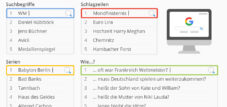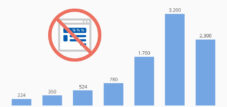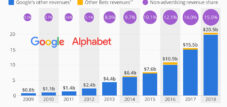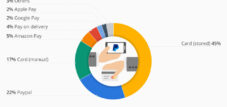Google hat 2018 mehr in EU-Geldbußen als in Steuern bezahlt
Sprachauswahl 📢
Veröffentlicht am: 12. Februar 2019 / Update vom: 23. April 2025 – Verfasser: Konrad Wolfenstein
EU-Geldbußen 2018: Ein Präzedenzfall für die Wirtschaft
Googles Steuerstrategie und EU-Sanktionen: Eine umfassende Analyse der Regulierung von Technologieriesen
Die Europäische Union hat sich in den vergangenen Jahren als entscheidende Gegenkraft zu den dominierenden Technologiekonzernen aus den USA positioniert. Besonders bemerkenswert war das Jahr 2018, in dem Google – oder genauer gesagt seine Muttergesellschaft Alphabet – mehr Geld für EU-Geldbußen ausgeben musste als für Steuerzahlungen weltweit. Dieses Ungleichgewicht verdeutlicht die Spannungen zwischen den gewinnorientierten Steueroptimierungsstrategien multinationaler Konzerne und dem Bestreben der Europäischen Kommission, faire Wettbewerbsbedingungen sowie angemessene Steuerbeiträge sicherzustellen. Die Rekordstrafen gegen Google markieren einen Wendepunkt in der digitalen Regulierungsgeschichte und stellen einen präzedenzlosen Eingriff in die Geschäftspraktiken der Technologiegiganten dar, der weitreichende Konsequenzen für die gesamte Branche mit sich bringt.
Die Entwicklung der EU-Kartellverfahren gegen Technologieriesen
Die Anfänge der EU-Regulierung im Technologiesektor
Die Geschichte der EU-Kartellverfahren gegen Technologieunternehmen begann nicht erst mit Google. Bereits zu Beginn des 21. Jahrhunderts geriet Microsoft ins Visier der europäischen Wettbewerbshüter. Die Europäische Kommission unter der damaligen Wettbewerbskommissarin Neelie Kroes nahm den Software-Giganten wegen seiner marktbeherrschenden Stellung in Bezug auf das Windows-Betriebssystem und den Internet Explorer unter die Lupe. Im Jahr 2004 verhängte die Kommission eine Geldbuße von 497 Millionen Euro gegen Microsoft und forderte das Unternehmen auf, eine Version seines Betriebssystems ohne den vorinstallierten Media Player anzubieten.
Diese frühen Auseinandersetzungen zwischen der EU und Microsoft legten den Grundstein für die spätere, noch intensivere Regulierung von Technologiekonzernen. Die EU-Kommission etablierte sich dadurch als führende Regulierungsbehörde im Bereich der digitalen Wirtschaft, lange bevor andere Regionen ähnlich entschlossen agierten. Der Erfolg dieser Maßnahmen ermöglichte es der Kommission, ihre Expertise in der Beurteilung komplexer digitaler Geschäftsmodelle zu vertiefen und ein regulatorisches Rahmenwerk zu entwickeln, das später auch auf andere Technologieunternehmen angewendet werden konnte.
Googles wachsende Probleme mit der EU-Kartellbehörde
Mit der zunehmenden Dominanz von Google auf dem europäischen Markt verschob sich der Fokus der EU-Wettbewerbshüter. Unter der Führung von Margrethe Vestager, die 2014 das Amt der EU-Wettbewerbskommissarin übernahm, intensivierte die Kommission ihre Untersuchungen gegen Google. Die dänische Politikerin wurde schnell für ihren unbeugsamen Ansatz bei der Regulierung großer Technologieunternehmen bekannt und schreckte nicht davor zurück, beispiellose Geldbußen zu verhängen.
Die erste große Strafe gegen Google erfolgte im Juni 2017. Die EU-Kommission verhängte eine Geldbuße von 2,4 Milliarden Euro wegen wettbewerbswidrigen Verhaltens im Zusammenhang mit Google Shopping. Die Untersuchung hatte ergeben, dass Google seine eigene Preisvergleichsplattform in den Suchergebnissen bevorzugt behandelte und konkurrierende Dienste systematisch benachteiligte. Die Kommission kam zu dem Schluss, dass Google seine marktbeherrschende Stellung im Bereich der Internetsuche missbrauchte, um sich in einem anderen Markt – dem für Preisvergleichsdienste – einen unrechtmäßigen Vorteil zu verschaffen.
Doch dies war nur der Anfang einer Reihe von Strafen gegen den Suchmaschinenriesen. Im Juli 2018 folgte die bis dahin höchste jemals von der EU-Kommission verhängte Geldbuße: 4,3 Milliarden Euro für wettbewerbswidrige Praktiken im Zusammenhang mit dem Android-Betriebssystem. Die Kommission stellte fest, dass Google Herstellern von Android-Geräten und Mobilfunknetzbetreibern rechtswidrige Einschränkungen auferlegt hatte, um seine marktbeherrschende Stellung zu festigen. Dazu gehörte die Verpflichtung, Google Search und den Chrome-Browser vorzuinstallieren sowie Beschränkungen für die Entwicklung alternativer Android-Versionen.
Die Rekordstrafe von 2018 und ihre finanziellen Auswirkungen
Die Dimension der Android-Strafe im Vergleich
Die Geldbuße von 4,3 Milliarden Euro (etwa 5,1 Milliarden US-Dollar) für Googles Praktiken im Zusammenhang mit Android übertraf jede zuvor verhängte Wettbewerbsstrafe der EU-Kommission bei weitem. Zum Vergleich: Die frühere Rekordstrafe gegen Intel aus dem Jahr 2009 betrug 1,06 Milliarden Euro. Die Höhe der gegen Google verhängten Sanktion spiegelte nicht nur die Schwere der festgestellten Verstöße wider, sondern auch die wirtschaftliche Größe und finanzielle Leistungsfähigkeit des Unternehmens.
Besonders bemerkenswert ist, dass die Geldbuße für Google im Jahr 2018 größer war als die gesamten Einkommenssteuern, die das Unternehmen weltweit zahlen musste. Dieser Umstand verdeutlicht die Diskrepanz zwischen der wirtschaftlichen Macht des Konzerns und seinen Steuerbeiträgen. Während Google Milliarden an Gewinnen erwirtschaftete, konnte das Unternehmen durch geschickte internationale Steuergestaltung seine Steuerlast erheblich reduzieren – ein Phänomen, das nicht nur bei Google, sondern bei vielen multinationalen Technologieunternehmen zu beobachten ist.
Die Steuerstrategien von Google und ihre Kritik
Googles effektiver Steuersatz sank im Jahr 2018 auf bemerkenswert niedrige 12 Prozent. Dies war teilweise auf den von der Trump-Administration eingeführten “Tax Cuts and Jobs Act” zurückzuführen, der die Körperschaftssteuer in den USA deutlich senkte. Doch bereits vor dieser Steuerreform hatte Google seine globale Steuerstruktur so optimiert, dass erhebliche Gewinne in Niedrigsteuerländern verbucht wurden.
Das irische “Double Irish with a Dutch Sandwich”-Modell war lange Zeit ein bevorzugtes Steueroptimierungsverfahren für Google und andere Technologieunternehmen. Dieses komplexe System ermöglichte es, Gewinne aus Europa über Irland und die Niederlande auf die Bermudas zu transferieren, wo keine Körperschaftssteuer anfällt. Obwohl diese Praxis legal war, wurde sie zunehmend kritisiert, da sie es Unternehmen ermöglichte, ihre Steuerlast in den Ländern zu minimieren, in denen sie tatsächlich Geschäfte machten und Gewinne erwirtschafteten.
Trotz der enormen Geldbuße konnte Google im Jahr 2018 einen Rekordgewinn von 30,7 Milliarden US-Dollar verbuchen. Dies verdeutlicht die immense Profitabilität des Unternehmens und wirft die Frage auf, ob selbst Strafen in Milliardenhöhe ausreichend sind, um das Verhalten von Technologiegiganten zu ändern. Für viele Kritiker waren die Geldbußen, so hoch sie auch erscheinen mochten, lediglich Betriebskosten, die das Unternehmen problemlos absorbieren konnte, ohne sein grundlegendes Geschäftsmodell zu ändern.
Das breitere Bild: EU versus Technologiegiganten
Der Fall Apple und die irischen Steuernachzahlungen
Google war nicht das einzige Technologieunternehmen, das ins Visier der EU-Kommission geriet. Im August 2016 entschied die Kommission, dass Apple 13 Milliarden Euro an Steuernachzahlungen an Irland leisten müsse. Die Untersuchung ergab, dass Irland dem Unternehmen über Jahre hinweg unzulässige Steuervergünstigungen gewährt hatte, die gegen EU-Beihilferecht verstießen. Diese Steuervergünstigungen ermöglichten es Apple, für seine in Europa erwirtschafteten Gewinne einen effektiven Steuersatz zu zahlen, der von 1 Prozent im Jahr 2003 auf 0,005 Prozent im Jahr 2014 sank.
Ironischerweise wollte die irische Regierung diese Nachzahlung zunächst nicht annehmen und legte gemeinsam mit Apple Berufung gegen die Entscheidung ein. Dieser ungewöhnliche Schritt verdeutlicht die komplexen wirtschaftlichen und politischen Interessen, die bei der Besteuerung multinationaler Unternehmen eine Rolle spielen. Irland hatte durch seine niedrigen Steuersätze und vorteilhaften Steuerregelungen zahlreiche internationale Technologieunternehmen angezogen und befürchtete, dass eine strengere Steuerpraxis diese Investoren verschrecken könnte. Dennoch wurde Irland schließlich gezwungen, das Geld einzuziehen und auf einem Treuhandkonto zu verwahren, während der Rechtsstreit fortgesetzt wurde.
Die EU-Strategie zur Regulierung digitaler Märkte
Die Maßnahmen der EU-Kommission gegen Google, Apple und andere Technologieunternehmen sind Teil einer breiteren Strategie zur Regulierung digitaler Märkte. Die Kommission hat erkannt, dass die traditionellen Wettbewerbsregeln nicht immer ausreichen, um die spezifischen Herausforderungen der digitalen Wirtschaft zu bewältigen. Die Besonderheiten digitaler Plattformen – wie Netzwerkeffekte, die Bedeutung von Daten als Wettbewerbsfaktor und die Tendenz zu “Winner-takes-all”-Märkten – erfordern neue regulatorische Ansätze.
In den Jahren nach den großen Kartellentscheidungen hat die EU ihre Regulierungsbemühungen intensiviert und neue Gesetzesinitiativen auf den Weg gebracht. Der Digital Markets Act (DMA) und der Digital Services Act (DSA) stellen einen umfassenden Rahmen für die Regulierung digitaler Plattformen dar. Der DMA zielt darauf ab, unfaire Geschäftspraktiken von großen Online-Plattformen zu unterbinden, während der DSA strengere Regeln für den Umgang mit illegalen Inhalten, mehr Transparenz bei Werbung und besseren Schutz der Grundrechte der Nutzer vorsieht.
Diese neuen Regulierungsansätze gehen über traditionelle Kartellverfahren hinaus und versuchen, strukturelle Probleme in digitalen Märkten proaktiv anzugehen. Sie spiegeln die Erkenntnis wider, dass nachträgliche Geldbußen allein nicht ausreichen, um einen fairen Wettbewerb in der digitalen Wirtschaft zu gewährleisten.
Die Reaktionen der Technologieunternehmen und die Auswirkungen auf ihre Geschäftsmodelle
Googles Anpassungsstrategien nach den EU-Strafen
Nach den massiven Geldbußen sah sich Google gezwungen, seine Geschäftspraktiken anzupassen, um weiteren Sanktionen zu entgehen. In Bezug auf Google Shopping führte das Unternehmen ein neues Auktionssystem ein, das konkurrierenden Preisvergleichsdiensten die Möglichkeit gab, in einem separaten Shopping-Bereich der Suchergebnisse zu erscheinen. Diese Lösung wurde jedoch von Wettbewerbern kritisiert, da sie immer noch Google Shopping bevorzuge und Konkurrenten zwinge, für Platzierungen zu bezahlen, während Google seine eigenen Dienste ohne zusätzliche Kosten anbieten könne.
Im Fall von Android kündigte Google an, Herstellern von Android-Geräten in Europa Lizenzgebühren für die Nutzung seiner Apps zu berechnen, falls sie sich entscheiden sollten, Google-Dienste wie den Play Store ohne Google Search und Chrome anzubieten. Dieses neue Lizenzmodell sollte die von der EU-Kommission kritisierte Bündelung von Diensten aufbrechen, wurde jedoch ebenfalls kritisch gesehen, da es für Hersteller wirtschaftlich oft unattraktiv blieb, auf Google-Dienste zu verzichten.
Darüber hinaus verstärkte Google seine Lobbyarbeit in Brüssel erheblich. Das Unternehmen erhöhte seine Ausgaben für Lobbyismus und engagierte eheemalige EU-Beamte, um seine Interessen zu vertreten. Gleichzeitig versuchte Google, sein Image zu verbessern, indem es Investitionen in Europa ankündigte, darunter neue Datenzentren und Forschungseinrichtungen für künstliche Intelligenz.
Die Auswirkungen auf andere Technologieunternehmen
Die Kartellverfahren gegen Google hatten Auswirkungen auf die gesamte Technologiebranche. Andere große Plattformen wie Amazon, Facebook (jetzt Meta) und Apple begannen, ihre eigenen Geschäftspraktiken zu überprüfen und anzupassen, um ähnliche Strafen zu vermeiden. So kündigte Amazon beispielsweise Änderungen an seinen Geschäftsbedingungen für Händler auf seinem Marktplatz an, nachdem die EU-Kommission eine Untersuchung eingeleitet hatte.
Facebook sah sich mit Untersuchungen bezüglich seiner Datensammlungspraktiken und der Integration verschiedener Dienste wie WhatsApp und Instagram konfrontiert. Das Unternehmen reagierte mit Anpassungen seiner Datenschutzrichtlinien und Bemühungen um mehr Transparenz. Dennoch blieben grundlegende Fragen bezüglich des Geschäftsmodells von Facebook, das auf umfangreicher Datensammlung und personalisierten Werbeanzeigen basiert, ungelöst.
Die Reaktionen der Technologieunternehmen zeigten ein Muster: Während sie bereit waren, spezifische Praktiken anzupassen, um unmittelbaren regulatorischen Druck zu mildern, vermieden sie grundlegende Änderungen an ihren Geschäftsmodellen. Dies führte zu einem fortlaufenden Katz-und-Maus-Spiel zwischen Regulierungsbehörden und Technologieunternehmen, bei dem die Unternehmen neue Wege suchten, ihre dominante Marktposition zu erhalten, während sie formell den regulatorischen Anforderungen entsprachen.
Die globale Dimension der Technologieregulierung
Der transatlantische Konflikt über die Regulierung von Technologieunternehmen
Die EU-Kartellverfahren gegen amerikanische Technologieunternehmen führten zu erheblichen Spannungen zwischen Europa und den USA. Die US-Regierung, insbesondere unter Präsident Trump, kritisierte die EU-Kommission scharf und warf ihr vor, amerikanische Unternehmen zu diskriminieren. Der damalige US-Präsident ging sogar so weit zu behaupten, dass die EU gegründet worden sei, um die USA im Handel auszunutzen, und drohte mit Gegenmaßnahmen wie Zöllen auf europäische Waren.
Diese Spannungen verdeutlichten unterschiedliche Philosophien in Bezug auf Wettbewerb und Regulierung. Während die USA traditionell einen eher zurückhaltenden Ansatz bei der Regulierung von Technologieunternehmen verfolgten und Innovationen und Wirtschaftswachstum in den Vordergrund stellten, betonte die EU stärker Verbraucherschutz, Datenschutz und fairen Wettbewerb. Diese unterschiedlichen Ansätze spiegelten sich auch in der öffentlichen Meinung wider: Während Umfragen in Europa eine breite Unterstützung für strengere Regulierungen von Technologieunternehmen zeigten, war die Haltung in den USA ambivalenter.
Dennoch begann auch in den USA ein Umdenken. Sowohl demokratische als auch republikanische Politiker begannen, die Marktmacht der großen Technologieunternehmen kritischer zu sehen. Die Biden-Administration signalisierte eine stärkere Bereitschaft zur Regulierung von Technologieunternehmen und zur Zusammenarbeit mit europäischen Partnern in diesem Bereich.
Die internationale Koordination von Digitalsteuern
Parallel zu den Kartellverfahren entwickelte sich eine internationale Debatte über die angemessene Besteuerung von Technologieunternehmen. Da digitale Geschäftsmodelle es ermöglichten, Gewinne leicht in Niedrigsteuerländer zu verschieben, begannen viele Länder, eigene Digitalsteuern einzuführen. Frankreich war eines der ersten Länder, das 2019 eine Steuer von 3% auf die lokalen Umsätze großer Internetunternehmen erhob, was wiederum zu Drohungen mit US-Zöllen führte.
Um einen fragmentierten Ansatz zu vermeiden, begannen die Organisation für wirtschaftliche Zusammenarbeit und Entwicklung (OECD) und die G20 Verhandlungen über eine international koordinierte Lösung. Im Jahr 2021 einigten sich schließlich 136 Länder auf einen historischen Kompromiss: eine globale Mindeststeuer von 15% für multinationale Unternehmen und eine neue Regelung zur Verteilung von Besteuerungsrechten, die es Ländern ermöglicht, einen Teil der Gewinne großer multinationaler Unternehmen zu besteuern, unabhängig davon, ob diese dort physisch präsent sind.
Diese Vereinbarung markierte einen Wendepunkt in der internationalen Steuerpolitik und adressierte einige der Bedenken, die durch die niedrigen Steuerzahlungen von Unternehmen wie Google aufgeworfen worden waren. Dennoch blieben Herausforderungen bei der Umsetzung bestehen, und der Erfolg des Abkommens hängt davon ab, wie konsequent es von den einzelnen Ländern umgesetzt wird.
Die Entwicklung seit 2018: Neue Herausforderungen und Regulierungsansätze
Die Fortsetzung der EU-Kartellverfahren
Die EU setzte ihre Kartellverfahren gegen Google und andere Technologieunternehmen auch nach 2018 fort. Im März 2019 verhängte die EU-Kommission eine weitere Geldbuße in Höhe von 1,49 Milliarden Euro gegen Google wegen wettbewerbswidriger Praktiken im Bereich der Online-Werbung. Die Untersuchung ergab, dass Google seine marktbeherrschende Stellung missbraucht hatte, indem es restriktive Klauseln in Verträgen mit Websites Dritter einführte, die konkurrierende Werbedienste daran hinderten, Werbeanzeigen auf diesen Websites zu schalten.
Mit dieser dritten großen Geldbuße erreichten die Strafen gegen Google durch die EU insgesamt die beeindruckende Summe von 8,2 Milliarden Euro innerhalb von nur drei Jahren. Trotz dieser massiven finanziellen Sanktionen blieb die grundlegende Marktposition von Google weitgehend unangetastet. Das Unternehmen blieb der dominierende Akteur in der Online-Suche, der mobilen Betriebssystemlandschaft und im digitalen Werbemarkt.
Parallel dazu weitete die EU-Kommission ihre Untersuchungen auf andere Technologieunternehmen aus. Amazon wurde wegen seiner Doppelrolle als Plattformbetreiber und Händler untersucht, und gegen Apple wurden Verfahren wegen des App Stores und der Behandlung von konkurrierenden Musikstreaming-Diensten eingeleitet. Facebook geriet wegen seiner Datensammlungspraktiken und der Übernahme potenzieller Konkurrenten ins Visier.
Von Geldbußen zu strukturellen Lösungen
Die Erfahrungen mit den Kartellverfahren gegen Google führten zu einer Erkenntnis bei den Regulierungsbehörden: Während Geldbußen ein wichtiges Instrument sein können, um vergangene Verstöße zu sanktionieren, sind sie möglicherweise nicht ausreichend, um das Verhalten von Unternehmen nachhaltig zu ändern oder strukturelle Wettbewerbsprobleme in digitalen Märkten zu lösen.
Diese Einsicht führte zu einem Paradigmenwechsel in der EU-Regulierungspolitik. Statt sich ausschließlich auf nachträgliche Sanktionen zu verlassen, begann die EU, proaktivere und strukturelle Ansätze zu verfolgen. Der Digital Markets Act (DMA), der im Jahr 2022 verabschiedet wurde, markierte diesen Wandel. Der DMA identifiziert sogenannte “Gatekeeper” – große Online-Plattformen, die als Torwächter zwischen Unternehmen und Verbrauchern fungieren – und unterwirft sie besonderen Verpflichtungen und Verboten.
Diese Verpflichtungen umfassen das Verbot der Selbstbevorzugung, die Pflicht zur Interoperabilität mit Drittdiensten und Einschränkungen bei der Kombination von Nutzerdaten aus verschiedenen Diensten ohne ausdrückliche Zustimmung. Verstöße gegen den DMA können zu Geldbußen von bis zu 10% des weltweiten Jahresumsatzes eines Unternehmens führen, und bei wiederholten Verstößen sogar zu strukturellen Maßnahmen wie der Entflechtung von Geschäftsbereichen.
Parallel dazu stärkte der Digital Services Act (DSA) die Verantwortlichkeit von Online-Plattformen für illegale Inhalte und erhöhte die Transparenzanforderungen. Diese neuen Regulierungsrahmen stellen einen umfassenderen Ansatz dar, der über traditionelle Kartellverfahren hinausgeht und versucht, die Grundlagen für einen faireren digitalen Markt zu schaffen.
Die Auswirkungen auf Verbraucher und die digitale Wirtschaft
Mehr Wahlmöglichkeiten und Transparenz?
Ein erklärtes Ziel der EU-Kartellverfahren und der neuen Regulierungsrahmen war es, Verbrauchern mehr Wahlmöglichkeiten zu bieten und den Wettbewerb zu fördern. Die Frage, inwieweit dieses Ziel erreicht wurde, ist jedoch komplex. In einigen Bereichen konnten positive Entwicklungen beobachtet werden: Die Anpassungen bei Google Shopping führten zu einer größeren Präsenz alternativer Preisvergleichsdienste in den Suchergebnissen, und die Änderungen bei Android ermöglichten es theoretisch den Herstellern, Geräte ohne Google-Apps anzubieten.
Dennoch blieben die grundlegenden Marktdynamiken weitgehend unverändert. Die starken Netzwerkeffekte und die umfangreichen Ressourcen der großen Technologieunternehmen machten es für neue Wettbewerber schwierig, signifikante Marktanteile zu gewinnen. Verbraucher neigten weiterhin dazu, bekannte und etablierte Dienste zu nutzen, selbst wenn Alternativen verfügbar waren. Die Bequemlichkeit integrierter Ökosysteme überwog oft das Interesse an neuen, möglicherweise innovativeren Angeboten.
In Bezug auf Transparenz wurden jedoch deutlichere Fortschritte erzielt. Die EU-Regulierungen zwangen Plattformen, ihre Geschäftspraktiken offenzulegen und ihre Algorithmen transparenter zu gestalten. Verbraucher erhielten mehr Information darüber, wie ihre Daten verwendet werden und wie personalisierte Anzeigen funktionieren. Diese erhöhte Transparenz stärkte die Position der Verbraucher und ermöglichte informiertere Entscheidungen.
Innovation und Wettbewerbsfähigkeit in der digitalen Wirtschaft
Eine häufig geäußerte Sorge war, dass übermäßige Regulierung die Innovation hemmen und die Wettbewerbsfähigkeit europäischer Unternehmen beeinträchtigen könnte. Kritiker argumentierten, dass strenge Regeln europäische Startups benachteiligen und das Wachstum des digitalen Sektors in Europa bremsen könnten.
Die empirischen Belege für diese Bedenken sind jedoch gemischt. Einerseits haben einige europäische Technologie-Startups von den Maßnahmen gegen dominierende Plattformen profitiert und konnten ihre Marktposition stärken. Die EU-Regulierungen schufen in einigen Bereichen gleiche Wettbewerbsbedingungen, die es kleineren Unternehmen ermöglichten, zu konkurrieren, ohne von den großen Plattformen ausgeschlossen zu werden.
Andererseits blieb Europa im Vergleich zu den USA und China bei der Hervorbringung globaler Technologieunternehmen zurück. Die Gründe dafür sind vielfältig und gehen über regulatorische Fragen hinaus: fragmentierte Märkte, Schwierigkeiten beim Zugang zu Risikokapital und kulturelle Unterschiede spielen ebenfalls eine Rolle. Dennoch entwickelte Europa in bestimmten Nischenbereichen wie Finanztechnologie, Gesundheitstechnologie und Unternehmens-Software eine starke Position.
Die Herausforderung für die EU besteht darin, einen regulatorischen Ansatz zu finden, der Verbraucher schützt und fairen Wettbewerb fördert, ohne Innovation zu ersticken. Der Fokus auf Interoperabilität und Datenmobilität in neueren Regulierungsansätzen könnte ein vielversprechender Weg sein, da er Wettbewerb ermöglicht, ohne etablierte Dienste direkt zu zerschlagen.
Von Europa bis USA: Der globale Aufbruch zur Technologieregulierung
Die Zukunft der Technologieregulierung
Die Erfahrungen mit Google und anderen Technologieunternehmen haben die Grundlage für einen umfassenderen und systematischeren Ansatz zur Regulierung digitaler Märkte gelegt. Mit dem DMA und dem DSA hat die EU einen Regulierungsrahmen geschaffen, der speziell auf die Herausforderungen digitaler Plattformen zugeschnitten ist. Diese Rahmenwerke werden voraussichtlich als Modell für ähnliche Initiativen in anderen Teilen der Welt dienen.
In den USA deutet sich ebenfalls ein Wandel hin zu einer strengeren Regulierung an. Die Biden-Administration hat bekannte Technologiekritiker in Schlüsselpositionen ernannt und signalisiert eine stärkere Bereitschaft, gegen marktbeherrschende Stellungen vorzugehen. Auch im US-Kongress gibt es parteiübergreifende Unterstützung für verschiedene Gesetzesvorschläge zur Regulierung von Technologieunternehmen.
Weltweit ist ein Trend zu stärkerer Regulierung digitaler Märkte zu beobachten. Länder wie Australien, Südkorea und Indien haben eigene Initiativen ergriffen, um die Macht großer Technologieplattformen einzudämmen. Diese globale Bewegung deutet darauf hin, dass die Ära der weitgehend unregulierten digitalen Expansion zu Ende geht und eine neue Phase beginnt, in der Technologieunternehmen mit komplexeren und anspruchsvolleren regulatorischen Anforderungen konfrontiert sein werden.
Nachhaltige Lösungen für die Besteuerung digitaler Unternehmen
Die Diskrepanz zwischen den massiven Gewinnen von Technologieunternehmen und ihren vergleichsweise geringen Steuerzahlungen bleibt ein wichtiges politisches Thema. Die globale Mindeststeuer von 15% stellt einen bedeutenden Fortschritt dar, doch ihre Wirksamkeit hängt von der konsequenten Umsetzung durch alle beteiligten Länder ab.
Darüber hinaus werden neue Ansätze zur Besteuerung digitaler Aktivitäten entwickelt. Diese zielen darauf ab, Steuern dort zu erheben, wo die Wertschöpfung tatsächlich stattfindet – also wo Nutzer Dienste in Anspruch nehmen und Daten generieren – und nicht nur dort, wo Unternehmen formal ansässig sind. Solche Ansätze könnten dazu beitragen, dass Technologieunternehmen einen angemesseneren Beitrag zu den öffentlichen Finanzen in den Ländern leisten, in denen sie tätig sind.
Die Herausforderung besteht darin, ein Steuersystem zu entwickeln, das fair, transparent und durchsetzbar ist, ohne übermäßige bürokratische Hürden zu schaffen oder internationale Wirtschaftsbeziehungen zu belasten. Dies erfordert weiterhin internationale Koordination und die Bereitschaft, traditionelle Steuerkonzepte an die Realitäten der digitalen Wirtschaft anzupassen.
Zwischen Innovation und Kontrolle: Die wachsende Rolle der Compliance
Die Kartellverfahren gegen Google und die daraus resultierenden Rekordgeldbußen markieren einen Wendepunkt in der Geschichte der Technologieregulierung. Sie verdeutlichten das Ungleichgewicht zwischen der wirtschaftlichen Macht globaler Technologieunternehmen und den bestehenden regulatorischen Rahmenwerken. Die Tatsache, dass Google im Jahr 2018 mehr für EU-Geldbußen als für Steuern ausgab, ist ein prägnantes Symbol für dieses Ungleichgewicht.
Die Erfahrungen mit Google haben wichtige Lehren für Regulierungsbehörden, Unternehmen und die Gesellschaft insgesamt mit sich gebracht. Sie haben gezeigt, dass nachträgliche Sanktionen zwar wichtig sind, aber möglicherweise nicht ausreichen, um strukturelle Probleme in digitalen Märkten zu lösen. Sie haben die Notwendigkeit eines proaktiveren und ganzheitlicheren Ansatzes zur Regulierung digitaler Plattformen deutlich gemacht, der Wettbewerb fördert, Verbraucher schützt und gleichzeitig Innovation ermöglicht.
Für Unternehmen verdeutlichen diese Fälle die wachsende Bedeutung regulatorischer Compliance und die Notwendigkeit, Geschäftsmodelle zu entwickeln, die mit den gesellschaftlichen Erwartungen in Einklang stehen. Die Zeit, in der Technologieunternehmen weitgehend frei von regulatorischen Einschränkungen agieren konnten, ist vorbei.
Für die Gesellschaft insgesamt unterstreichen diese Entwicklungen die Bedeutung einer robusten öffentlichen Debatte über die Rolle von Technologie und die Macht großer Technologieunternehmen. Sie werfen grundlegende Fragen darüber auf, wie wir die digitale Wirtschaft so gestalten können, dass sie nicht nur wirtschaftlich effizient, sondern auch fair, inklusiv und demokratisch verantwortlich ist.
Die Geschichte von Google und den EU-Geldbußen ist daher nicht nur eine Geschichte über Kartellrecht und Steuerpolitik, sondern auch ein Kapitel in der größeren Erzählung darüber, wie Gesellschaften versuchen, technologischen Wandel in einer Weise zu bewältigen, die gemeinsame Werte und Ziele fördert. In dieser Hinsicht stellt sie einen wichtigen Meilenstein in unserer kollektiven Anstrengung dar, die digitale Zukunft zu gestalten.
Ihr globaler Marketing und Business Development Partner
☑️ Unsere Geschäftssprache ist Englisch oder Deutsch
☑️ NEU: Schriftverkehr in Ihrer Landessprache!
Gerne stehe ich Ihnen und mein Team als persönlicher Berater zur Verfügung.
Sie können mit mir Kontakt aufnehmen, indem Sie hier das Kontaktformular ausfüllen oder rufen Sie mich einfach unter +49 89 89 674 804 (München) an. Meine E-Mail Adresse lautet: wolfenstein∂xpert.digital
Ich freue mich auf unser gemeinsames Projekt.



























